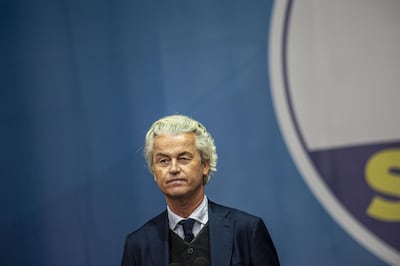With Europeans approaching the next parliamentary vote split down the middle on the benefits of immigration, few can claim to have the perspective possessed by Joram van Klaveren.
As a spokesman for Geert Wilders’s anti-immigration Party for Freedom (PVV) a decade ago, the Dutch politician fought tooth and nail to ban burqas and minarets in the Netherlands, making headlines for his anti-Islam statements.
Now a Muslim convert and author of the book Apostate: From Christianity to Islam in Times of Secular Terror, he calls out populist parties fuelling Islamophobia in an attempt to win votes in the next European Parliament elections.
"The PVV policy was: everything that did not work had to be linked to Islam in one way or another," Mr Van Klaveren told The National. "Nationalist parties don't want to listen – they use the fear of Islam to gain political power."
The Netherlands is one of the European countries that looks set to send a strong Eurosceptic contingent to the European Parliament. The Forum for Democracy (FvD), led by founder Thierry Baudet, ran series of successful campaigns by presenting a more respectable version of Mr Wilders’s anti-immigration rhetoric.

In March, it did well in provincial contests and it is now leading opinion polls, ahead of the governing Liberal Party.
Mr Van Klaveren’s own political career is intertwined with the rise of the far-right in the Netherlands. In 2004, he was part of a splinter group led by Mr Wilders that left the conservative-liberal People's Party for Freedom and Democracy in 2006 over Turkey’s possible accession to the European Union.
“I was still very anti-Islamic then and Turkey is a Muslim country [that would have] become the second biggest in the European Union,” Mr Van Klaveren said.
The PVV started off as a conservative party but soon drifted towards more extreme views on migration and religion.
It filed a motion in 2007 calling for a halt to immigration from Muslim countries. The group also launched a website to collect complaints about Central and Eastern European immigrants, and fought to ban burqas and minarets in the Netherlands.
As a Protestant who grew up in a family that looked down on Islam, Mr Van Klaveren was at first comfortable with the PVV’s views. That was until its figurehead, Mr Wielders, asked a crowd of supporters whether they wanted more or less Moroccan migrants and the crowd chanted back: “less, less, less!”
“I thought it was going too far. It was no longer about an ideology but about a people,” he said.
Mr Van Klaveren left the PVV as hatred of immigrants flared up and attacks on mosques became more frequent. After a brief attempt to form his own party, he set out to write a book that would give his anti-Islam views a theoretical base.
"I wanted to prove that [Muslims] ... promote terrorism... but I found that there were no Islamic sources to prove this, only orientalist sources," he said.
He converted to Islam halfway through writing the book, in October 2018.
His former ally, Mr Wilders, compared him to a vegetarian who found a job in a slaughterhouse. Death threats and hateful emails now come from what was once his end of the political spectrum.
Mr Van Klaveren has taken back his statements on Islam, saying his views were "simply wrong". But if Europe wants to rid itself of Islamophobia, he says it must face the "big problem" that is immigration and address people's legitimate concerns.
“Terrorism is a real threat. It is not something that people have invented; it is real. And it is also true that there are ISIS cells among refugees,” he said. “Mainstream parties are afraid to talk about immigration, but they will have to take the topic back because right now the [discourse is controlled] by the populist parties,” he said.
Projections show anti-immigration parties winning a third of seats at the European Parliament. Mr Van Klaveren worries the populist ideas he contributed to could "now become policies".
“I think it is very important that we reach a common ground,” he said. The book born out of his initial resentment for Islam calls instead for coexistence and mutual understanding.
In it, Mr Van Klaveren cites a folk tale where a man asks another how to get to the other side of a river. “Why do you ask me, as you are already on the other side,” the other man replied.
For the former far-right politician, the tale is yet another reminder that there are always two sides to every story.

